Kenneth Atchity's Blog, page 86
November 24, 2019
Tiny VictoThe Brontë Society paid big money for a tiny, tiny book by Charlotte Brontë.ry
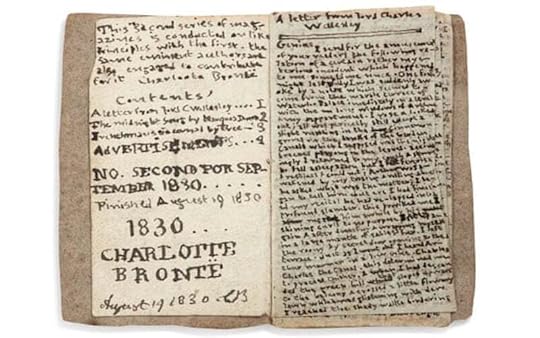
After “years of chasing [it],” the Brontë Society has at last acquired the last in a series of very tiny books that Charlotte Brontë wrote in 1830, when she was 14. The Society paid €600,000 for the book at auction, after losing out on it to an “investment scheme” in 2011. This time, the Brontë Society received public donations thanks, in part, to an appeal from Dame Judi Dench.
The book measures 35mm x 61mm, and was part of a series of six entitled “The Young Men’s Magazines” (one of which has been missing since 1930). The books were written for the Brontë siblings’ toy soldiers (adorable), and the most recent acquisition contains three handwritten stories.
All five surviving tiny books will be reunited at the Brontë Parsonage Museum in Yorkshire. Tiny congratulations to all!
[via The Guardian]

Published on November 24, 2019 00:00
November 22, 2019
Ken Atchity Quotes...
“If you have a dream, you have a responsibility to yourself and to us to make it come true. That’s the most important thing in your life. Don’t let anything stand in its way.”
― Kenneth John Atchity, The Messiah Matrix


― Kenneth John Atchity, The Messiah Matrix


Published on November 22, 2019 00:00
November 20, 2019
Guest Post: Prevention — the goalie of the health care world by Dr. Dave Davis
My worry is that the current provincial government may reduce health-care costs without consideration for long term, down-the-road consequences
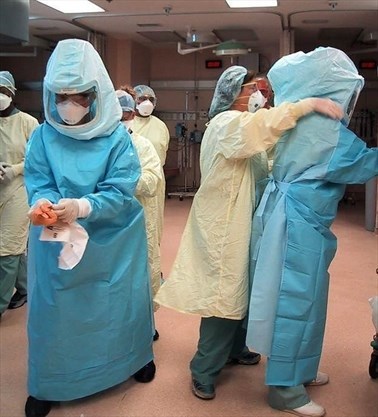 Hospital staff during the 2003 SARS crisis. Dave Davis worries that the current Ontario government could be putting cuts in place that jeopardize our ability to handle the next SARS-like crisis. - NYGH Archives
Hospital staff during the 2003 SARS crisis. Dave Davis worries that the current Ontario government could be putting cuts in place that jeopardize our ability to handle the next SARS-like crisis. - NYGH Archives
On the phone, my patient sounded as though her nose was plugged. Nasally. She said, "I've been sneezing, you know, Doctor. Runny nose, sore throat. Coughing a lot. I feel silly calling, but I heard about that poor nurse who died this week."
There was something else in her voice too: worry. The patient's daughter was a nurse, one of many who worked at the hospital where a second outbreak of SARS had claimed a staff member. Her daughter was unaffected, but she, my patient — well, you hear her.
I want to tell you two things about the call. Maybe three. OK, three.
The first: it was 2003, toward the end of the outbreak of Sudden Acute Respiratory Syndrome or SARS. Apart from the killer commute, I loved working in the large University of Toronto teaching clinic, seeing patients, teaching (and learning from) students and residents. I was as sleepless as my patient I think, but for a different reason: I was angry, frustrated that we had to close the clinic. And frightened too, a bit.
I still am. I'll tell you why in a second.
It was surreal: the clinic was closed for weeks, the product of the sinister, infectious, cold-mimicking SARS. Based in outpatient clinics and doctor's offices, most Ontario physicians were tied to their phones, as frustrated as I was. When we did return to work, we were gowned like astronauts, strangers in a strange land, our temperatures recorded outside the building before we were allowed in. SARS was a tragic thing: 40-plus deaths, many seriously harmed. It held many lessons, perhaps best captured by the calm, competent, late Donald Low:
www.ncbi.nlm.nih.gov/books/NBK92467/
It was also, to a large extent, preventable.
Ontario didn't fare so well with SARS at the outset: our public health and regulatory framework had been seriously damaged by an overly cost-conscious government in the late nineties. In the town of Walkerton, for example, fiscal conservatives had reduced or privatized many inspection services, compromising water safety: seven people died, hundreds became ill. A false economy, a tragic outcome.
And something like SARS could happen again: take MERS for example. Middle East Respiratory Syndrome is a viral illness with a fatality rate of over 30 per cent, especially among the young. Caused by direct physical contact with camel saliva (so, pretty unlikely to affect us), this virus, like many, can morph into an illness spread by sneezing or coughing. That spread would be something to watch (and watch out for), like a wildfire spreading across the globe. Not a probability, but clearly a possibility: from the camel markets of Oman, to the huge nexus of Dubai, one of the world's busiest airports, to every point of the globe.
That brings me to the second thing — anxiety. In 2003, my patient and colleagues had reason for worry: patients made seriously ill from something that started out like a harmless cold; health-care workers and others dying from contact with patients. I remember one death in particular, a family physician who attended our University of Toronto's continuing education events. Like the firemen of 9/11, he was a brave first responder, who, as they say, "had to go back in," to look after his patients.
Anxiety is important, so much so that we teach family doctors to be aware of the one — diagnosis trap: identifying and treating only the biological or medical aspects of a patient's illness may be necessary, but certainly not sufficient for complete patient care. For almost any problem, there's an accompanying (often underlying) emotional component — worry, anxiety, depression. Even a broken arm has psychological and social implications: will the patient be able to work? Will she be able to afford her rent? How, exactly, did the broken arm happen?
Many of us carry that second element with us, silently, often unaddressed, bringing me to the third point. Today, a decade and a half after SARS, my worry is that the current provincial government may reduce health-care costs without consideration for long term, down-the-road consequences, without the awareness of the false economy of Walkerton. SARS speaks to us today as clearly as it did then: prevention, the unsung hero, is not sexy. It's also crucial. It's easily ignored or reduced to denigrating important things like restaurant inspections.
Prevention is the goalie of the health care world.
Let's hope — maybe demand is a better word — that no patient has to worry that a common cold, or any other virus, can kill her.
Dave Davis, MD, is a retired family doc and medical educator. His first novel, "A Potter's Tale," published by Story Merchant Books, Los Angeles, is available on Amazon in Canada, CA and the US. You can visit him at www.drdavedavis.com, or follow him @drauthor24

 Hospital staff during the 2003 SARS crisis. Dave Davis worries that the current Ontario government could be putting cuts in place that jeopardize our ability to handle the next SARS-like crisis. - NYGH Archives
Hospital staff during the 2003 SARS crisis. Dave Davis worries that the current Ontario government could be putting cuts in place that jeopardize our ability to handle the next SARS-like crisis. - NYGH ArchivesOn the phone, my patient sounded as though her nose was plugged. Nasally. She said, "I've been sneezing, you know, Doctor. Runny nose, sore throat. Coughing a lot. I feel silly calling, but I heard about that poor nurse who died this week."
There was something else in her voice too: worry. The patient's daughter was a nurse, one of many who worked at the hospital where a second outbreak of SARS had claimed a staff member. Her daughter was unaffected, but she, my patient — well, you hear her.
I want to tell you two things about the call. Maybe three. OK, three.
The first: it was 2003, toward the end of the outbreak of Sudden Acute Respiratory Syndrome or SARS. Apart from the killer commute, I loved working in the large University of Toronto teaching clinic, seeing patients, teaching (and learning from) students and residents. I was as sleepless as my patient I think, but for a different reason: I was angry, frustrated that we had to close the clinic. And frightened too, a bit.
I still am. I'll tell you why in a second.
It was surreal: the clinic was closed for weeks, the product of the sinister, infectious, cold-mimicking SARS. Based in outpatient clinics and doctor's offices, most Ontario physicians were tied to their phones, as frustrated as I was. When we did return to work, we were gowned like astronauts, strangers in a strange land, our temperatures recorded outside the building before we were allowed in. SARS was a tragic thing: 40-plus deaths, many seriously harmed. It held many lessons, perhaps best captured by the calm, competent, late Donald Low:
www.ncbi.nlm.nih.gov/books/NBK92467/
It was also, to a large extent, preventable.
Ontario didn't fare so well with SARS at the outset: our public health and regulatory framework had been seriously damaged by an overly cost-conscious government in the late nineties. In the town of Walkerton, for example, fiscal conservatives had reduced or privatized many inspection services, compromising water safety: seven people died, hundreds became ill. A false economy, a tragic outcome.
And something like SARS could happen again: take MERS for example. Middle East Respiratory Syndrome is a viral illness with a fatality rate of over 30 per cent, especially among the young. Caused by direct physical contact with camel saliva (so, pretty unlikely to affect us), this virus, like many, can morph into an illness spread by sneezing or coughing. That spread would be something to watch (and watch out for), like a wildfire spreading across the globe. Not a probability, but clearly a possibility: from the camel markets of Oman, to the huge nexus of Dubai, one of the world's busiest airports, to every point of the globe.
That brings me to the second thing — anxiety. In 2003, my patient and colleagues had reason for worry: patients made seriously ill from something that started out like a harmless cold; health-care workers and others dying from contact with patients. I remember one death in particular, a family physician who attended our University of Toronto's continuing education events. Like the firemen of 9/11, he was a brave first responder, who, as they say, "had to go back in," to look after his patients.
Anxiety is important, so much so that we teach family doctors to be aware of the one — diagnosis trap: identifying and treating only the biological or medical aspects of a patient's illness may be necessary, but certainly not sufficient for complete patient care. For almost any problem, there's an accompanying (often underlying) emotional component — worry, anxiety, depression. Even a broken arm has psychological and social implications: will the patient be able to work? Will she be able to afford her rent? How, exactly, did the broken arm happen?
Many of us carry that second element with us, silently, often unaddressed, bringing me to the third point. Today, a decade and a half after SARS, my worry is that the current provincial government may reduce health-care costs without consideration for long term, down-the-road consequences, without the awareness of the false economy of Walkerton. SARS speaks to us today as clearly as it did then: prevention, the unsung hero, is not sexy. It's also crucial. It's easily ignored or reduced to denigrating important things like restaurant inspections.
Prevention is the goalie of the health care world.
Let's hope — maybe demand is a better word — that no patient has to worry that a common cold, or any other virus, can kill her.
Dave Davis, MD, is a retired family doc and medical educator. His first novel, "A Potter's Tale," published by Story Merchant Books, Los Angeles, is available on Amazon in Canada, CA and the US. You can visit him at www.drdavedavis.com, or follow him @drauthor24

Published on November 20, 2019 00:00
November 18, 2019
The Music Man Robert Kraft!
Robert Kraft, discusses career killers, writing TV theme songs, and his climb to becoming the Executive in Charge of Music for more than 300 Fox feature films.


Published on November 18, 2019 00:00
November 16, 2019
The Messiah Matrix Translated into Spanish!
Published on November 16, 2019 00:00
November 14, 2019
Kenneth Atchity Featured in The Visionary
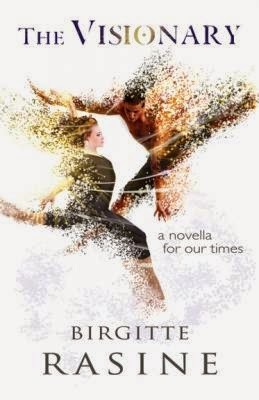 Get The Visionary in print or for your iPad, Kindle, Nook, or Kobo.
Get The Visionary in print or for your iPad, Kindle, Nook, or Kobo.
"You cannot fail at being yourself, which means doing with all your might what you were born to do with your light, your vision, and your time.”
There is no such thing as was—only is,” William Faulkner wrote. “If was existed, there would be no grief or sorrow.” Time is a human creation.

Time keeps then now. Time causes aging, not age. A mayfly has no time to realize its lifecycle is mere hours; fellow mayflies don’t remind it or post countdown clocks on its walls. By and within ourselves we are ageless. And time is what we make of it. We must make the time to do what we do best, what we were born to do.Light is the universal mind revealing its potential. “Let there be light,” the creator said, and his very words were the light “that shineth in the darkness, and the darkness did not comprehend it.” Without the darkness whence it came, there would be no light; darkness is the chaos created by fear, unease with the universe—but also the womb of love and light. Light begets perception, and perception at its brightest is what we call vision.
Let your voice rise to the heavens called the Elder and the voices of the group rose strong and clear to greet the First Ray to celebrate its arrival in the cycle of this new lifetime as the ancients called the day this new journey of the Earth around the axis of its heart, to welcome it with outstretched arms and hearts wide open yes here the Light loved to shine
Reading Birgitte’s words makes me rejoice anew in that time of first light that I’ve sought throughout my life to dedicate to vision. Born on a farm, I’m happiest when I awaken an hour or two before dawn. This is my time, spent with a cup of savory coffee and a half-hour of reading inspirational words like these; followed by attending to my latest “visionary” project. Currently, that’s the completion of a family chronicle; prior to that it was my novel The Messiah Matrix, which explores the origins of Christianity from an unusual and little-discussed historical perspective.
I believe in the power of stories to change the world. My passion for stories has not only changed my life; it has been my life—hundreds of books sold to publishers or published by Story Merchant Books, two dozen New York Times bestsellers, thirty movies produced to date, several television series sold. All stories I felt needed to be told. It’s been my beloved vocation to inspire storytellers to reach for their maximum audiences. The books and movies we’ve developed have reached millions worldwide and it’s the best feeling to hear, on a plane from Hong Kong to Tokyo, that a complete stranger saw “Hysteria” or “The Kennedy Detail” and loved it.
Each day I’m ready for the sunrise, facing it with an exhilarating sense of promise and potential—and the power to choose how I fulfill it.
Vision weaves light and time into patterns, drawing our attention to them as confidently as male peacocks spread their tail feathers, young bucks clash with their antlers, or sea anemones vibrate color, drawing attention to the lifeforce’s need to replicate itself, thereby overcoming time and dancing with love and immortality.
What is the purpose of this cosmic dance? we wonder. What is the purpose of life? Just as a California poppy bursts open with hues brighter than the rainbow, an antelope leaps across the Colorado prairie because she can, or the alpha lion’s mane grows shaggier with power, the purpose of life is simply to fill our human experience with forms we create to celebrate the splendor and beauty of the universal mind.
One of those forms is time, the first expression created by humanity in response to the universal creation of light. While we wait for life to make its ultimate expression known to us, we ourselves reach for it by bathing in the light the universe sends to remind us of its eternal promise.
No matter how far we ever are from reaching that highest expression of ourselves, let us remember the words of Spanish philosopher José Ortega y Gasset: “I think the only immoral thing is for a being not to live every instant of its life with the utmost intensity.” That’s what Mahatma Gandhi meant when he declared, “Full effort is full success.”
Birgitte’s mellifluous prose reminds us that you cannot fail at being yourself, which means doing with all your might what you were born to do with your light, your vision, and your time.
~ Ken Atchity
Dr. Kenneth Atchity is an American producer and author who has worked in the world of letters as a literary manager, editor, speaker, writing and career coach, columnist, book reviewer, and professor of comparative literature. Called a "story merchant" by a visiting ambassador to the United States, Ken's life passion is finding great storytellers and turning them into bestselling authors and screenwriters.
A member of the Academy of Television Arts & Sciences, Ken has made numerous radio and television appearances and given keynote speeches at conferences throughout the world. He has produced over 30 films, including the Emmy-nominated “The Kennedy Detail,” and received awards and grants from the American Council of Learned Societies, the National Endowment for the Humanities, the Mellon Foundation.
Following studies at Georgetown (A.B., English/Classics) and Yale (M.Phil. Theater History, Ph.D. Comparative Literature), Ken has served as professor and chairman of comparative literature and creative writing at Occidental College; editor of Contemporary Quarterly: Poetry and Art ; columnist-reviewer for The Los Angeles Times Book Review ; Distinguished Instructor, UCLA Writers Program; and Fulbright Professor of American Studies at the University of Bologna.
Learn more about Ken and his work at www.storymerchant.com.Reposted from The Visionary

Published on November 14, 2019 00:00
November 12, 2019
The Meg Wins “Best Film” at the 2019 UCFTI Golden Screen Awards in the Chinese/American Co-Production Category
Published on November 12, 2019 11:39
The Meg Wins “Best Film” at the 2019 UCFTI Golden Screen Awards in the Chinese/American Co-Production section!
Published on November 12, 2019 11:39
November 11, 2019
Samuel Bernstein's New Play Runs through December 15 at Pacific Resident Theatre!
Sometimes a death in the family is the beginning of everything.

The Hoffman family meets to sell their late mother’s Upper East Side brownstone and divide a houseful and lifetime of memories. Ancient dramas of childhood run smack into the fresh grief of mourning. The questions that arise are not easily answered. What does it mean to be in midlife and fear you’ve made all the wrong choices? What does it mean to carry unbearable burdens? What does it mean to trust in everything that family is, but also accept everything it isn’t and can never be…
Runs the first two weekends of November and December. TICKETS


The Hoffman family meets to sell their late mother’s Upper East Side brownstone and divide a houseful and lifetime of memories. Ancient dramas of childhood run smack into the fresh grief of mourning. The questions that arise are not easily answered. What does it mean to be in midlife and fear you’ve made all the wrong choices? What does it mean to carry unbearable burdens? What does it mean to trust in everything that family is, but also accept everything it isn’t and can never be…
Runs the first two weekends of November and December. TICKETS

Published on November 11, 2019 00:00
November 9, 2019
R.I.P. Kennedy Detail SSA - WINSTON LAWSON
In June 2010, seven Secret Service agents who were on the Kennedy Secret Service Detail reunited in Dallas along with their wives, for the emotional filming of a Discovery Channel special documentary based on the book, The Kennedy Detail. It was an unforgettable experience that brought back fond memories of the brotherhood of this close-knit group, but that, of course, also forced them to relive the most tragic day of their lives. Win Lawson was one of them.
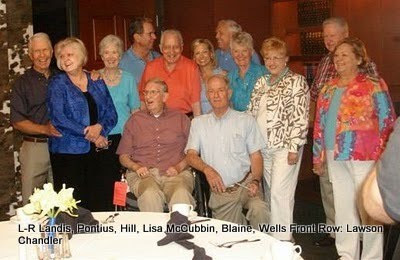
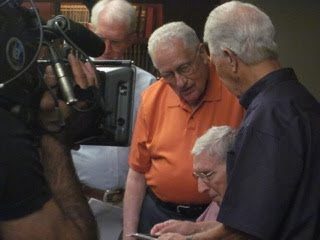
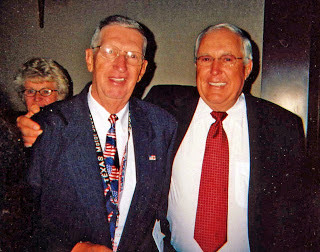 With Jerry Blaine
With Jerry Blaine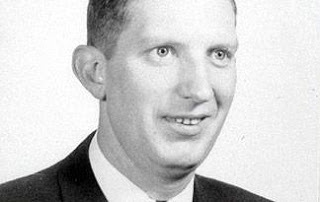 Win Lawson was commissioned by the Secret Service in 1959 as a Special Agent and in 1961 was transferred to the White House Detail. SA Lawson served under Presidents Kennedy & Johnson, and Vice Presidents Humphrey & Agnew before being transferred to Secret Service Headquarters in various jobs.
Win Lawson was commissioned by the Secret Service in 1959 as a Special Agent and in 1961 was transferred to the White House Detail. SA Lawson served under Presidents Kennedy & Johnson, and Vice Presidents Humphrey & Agnew before being transferred to Secret Service Headquarters in various jobs.Win Lawson retired in 1981 as Deputy Assistant Director of Inspection.
Interview - WTVR - November 2013
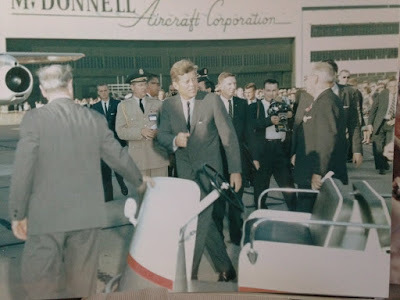
RICHMOND, Va. (WTVR) – His job was to protect the President of the United States. Fifty years after the assassination of President John F. Kennedy, it is a job that still haunts Secret Service Special Agent Winston Lawson to this day.
“You knew it was an important job. You couldn’t let it get to you too much,” Lawson said in his first television interview since the assassination.
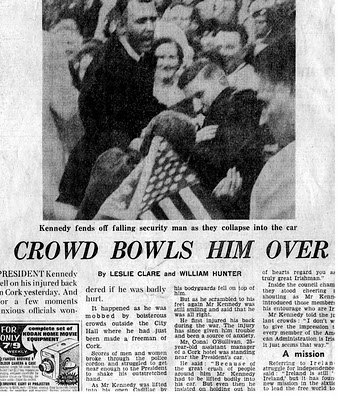
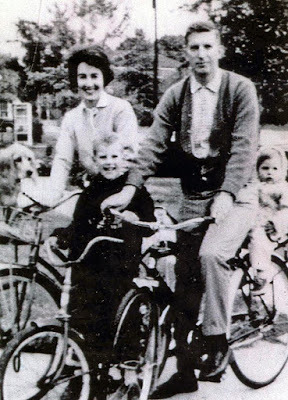
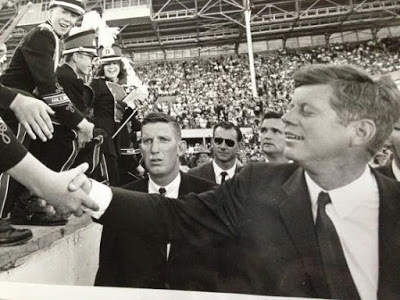
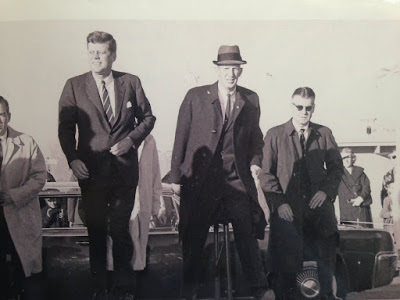
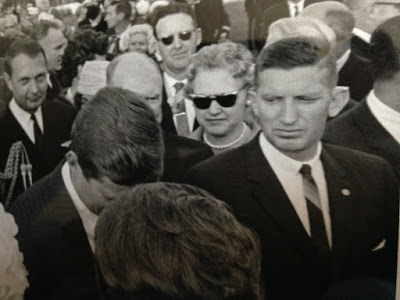
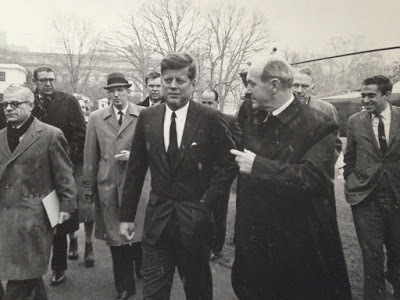
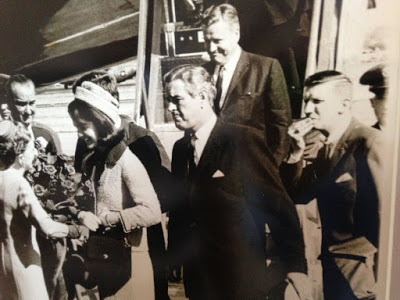

Published on November 09, 2019 09:16








